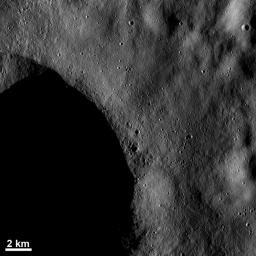The low sun elevation in this Dawn framing camera (FC) image of Vesta enhances small topographic details near the rim of the large crater, part of which is visible in the bottom left of the image. While most of this large crater is in shadow, the sunlit part of the image reveals boulders, which are house-sized or even larger. These boulders are recognized by their bright right sides that face towards the sun and their shadowed left sides that face away from the sun. The boulders were ejected when the large crater was formed and were emplaced near the crater rim. Also, numerous smaller craters are seen in this image, some of which may also have been formed by material ejected from the large crater.
This image is located in Vesta's Bellicia quadrangle, in Vesta's northern hemisphere. NASA's Dawn spacecraft obtained this image with its framing camera on Dec. 13, 2011. This image was taken through the camera's clear filter. The distance to the surface of Vesta is 198 kilometers (123 miles) and the image has a resolution of about 19 meters (62 feet) per pixel. This image was acquired during the LAMO (low-altitude mapping orbit) phase of the mission.
The Dawn mission to Vesta and Ceres is managed by NASA's Jet Propulsion Laboratory, a division of the California Institute of Technology in Pasadena, for NASA's Science Mission Directorate, Washington D.C. UCLA is responsible for overall Dawn mission science. The Dawn framing cameras have been developed and built under the leadership of the Max Planck Institute for Solar System Research, Katlenburg-Lindau, Germany, with significant contributions by DLR German Aerospace Center, Institute of Planetary Research, Berlin, and in coordination with the Institute of Computer and Communication Network Engineering, Braunschweig. The Framing Camera project is funded by the Max Planck Society, DLR, and NASA/JPL.
More information about the Dawn mission is online at http://www.nasa.gov/dawn and http://dawn.jpl.nasa.gov.

 Planetary Data System
Planetary Data System












